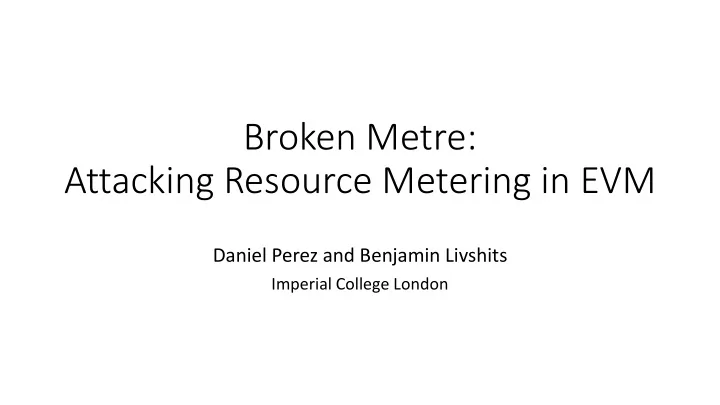

Broken Metre: Attacking Resource Metering in EVM Daniel Perez and Benjamin Livshits Imperial College London
Ethereum Smart Contracts
Gas Metering • Each instruction consumes gas to execute • Program gas cost = base cost + sum of instructions cost • Program stops if it runs over its gas budget • Transaction sender choses gas price and pays “gas cost x gas price”
Previous Attacks on Metering EXTCODESIZE attack SUICIDE attack • EXTCODESIZE is IO-intensive: needs • SUICIDE kills a contract and sends to read the state all the Ether to a specified target • SUICIDE was free at time of attack • Only cost 20 gas at time of attack • Specifying a new address when calling SUICIDE would create it for free • Attacker spammed network with • Attacker spammed network with transactions performing many address creation/destruction EXTCODESIZE • SUICIDE priced changed to 5,000 and creating contract now • Price was increased to 700 gas consumes gas
Analysis Setup • Fork aleth (C++ client) • Instrument CPU • Record execution time/instruction • Aggregate over 1,000 instructions • Instrument memory • Override new/delete • Replay transactions and record stats
Gas and Resources Correlation • Compute correlation between Resource Correlation gas usage and different resources Memory 0.755 CPU 0.507 • Correlation with CPU (execution Storage 0.907 time) alone is non-existent Storage/Memory 0.938 Storage/Memory/CPU 0.893 • Adding CPU decreases the correlation with gas
High-Variance Instructions • Most high-variance instructions Instruction Mean ( μs ) Stdev depend on state BLOCKHASH 768 578 BALANCE 762 449 SLOAD 514 402 • Even when aggregated over EXTCODECOPY 403 361 1,000 calls, standard deviation is EXTCODESIZE 221 245 close to mean
Effect of Cache on Execution Time • Focus on OS page cache • Generate random programs and measure speed with and without cache • Programs run on average 28 times faster with page cache
Resource Exhaustion Attack • Goal is to find programs which minimize throughput (gas / second) • Can be formulated as a search problem • Search space: Set of valid programs • Function to optimize: throughput • Constraint: gas budget • Search space is too large to be explored entirely • We use a genetic algorithm to approximate a solution
Generated Programs • We create programs valid by construction • Enough elements on stack • No stack overflows • Only access “reasonable” memory locations • Cross-over and mutations also only create valid programs • Generated programs do not contains loop • i.e. we do not include JUMP or JUMPI instructions
Initial Program Construction • Good initialization values are important to converge in reasonable time • To create initial program, we sample instructions as follow: given set of instructions I , we define the weight and probability of choosing an instruction with 1 𝑋 𝑗 ∈ 𝐽 = log 1 + 𝑢ℎ𝑠𝑝𝑣ℎ𝑞𝑣𝑢 𝑗 𝑋(𝑗) 𝑄(𝑗 ∈ 𝐽) = σ 𝑗′∈𝐽 𝑋(𝑗 ′ )
Genetic Algorithm Results • Initial program throughput: ~3M gas/s (compared to 20M on average) • Decreases quickly to 500K • Plateau at ~100K gas/s at generation 200 200x slower than average contract
DoS potential • Implications • Feasibility • Nodes not being able to sync • Costs only ~0.7 USD to keep commodity hardware node out-of- • Decrease in network throughput sync for 1 block (~2M gas/block) • Probable attackers • Limitations • Miners (selfish-mining) • Current attack works best on • Parties hostile to Ethereum (other commodity hardware chains) • Hard to know what hardware full • Speculators nodes are running
Evaluation on Different Clients Client Throughput (gas/s) Time (s) IO load (MB/s) Aleth 107,349 93.6 9.12 Parity 210,746 47.1 10.0 Geth 131,053 75.6 6.57 Parity (bare-metal) 542,702 18.2 17.2 Geth (fixed) 3,021,038 3.33 0.72 Evaluation of different clients when executing 10M (1 block) gas worth of malicious transactions
Improving Metering Short term Long term • Increase cost of IO operations • Stateless clients • Already seen in EIP 150 or EIP • Client do not need to keep track of 2200 all the state • Necessary data is sent with the • Reduce number of required IO transactions accesses • Sharding • Flattened contracts state • Not a direct solution but less state • Bloom filter to reduce search of needed per node inexistent contracts
Summary • Re-execute several months of transactions and measure gas, CPU and memory consumption • Find several inconsistencies • Show the impact of caching on execution speed • Present a new attack targeted at metering • Show that the attack works on all major clients • Disclosed attack to Ethereum Foundation and tested fixes • Thanks to Matthias Egli and Hubert Ritzdorf from PwC Switzerland
Supporting Slides
Responsible Disclosure • 2019/10/3: Sent report to Ethereum Foundation through bounty program (thanks to Matthias Egli and Hubert Ritzdorf from PwC Switzerland) • 2019/10/4: Reply from Ethereum Foundation • 2019/10 – 2019/11: Tests with ongoing fixes • 2019/11/17: Ethereum Foundation confirmed reward of 5000 USD • 2020/1/7: Official bounty reward announcement
Arithmetic Instructions Gas pricing for arithmetic instructions is very inconsistent Instruction Gas Count Mean Throughput cost time (gas/ μs ) (ns) ADD 3 453,069 82.20 36.50 MUL 5 62,818 96.96 51.57 DIV 5 107,972 476.23 10.50 EXP ~51 186,004 287.93 177.1
Analysis Summary • Gas cost : Many inconsistencies • IO operations : very high execution time variance • Cache : very important effect on speed • Overall : cannot model IO operations very well
Recommend
More recommend